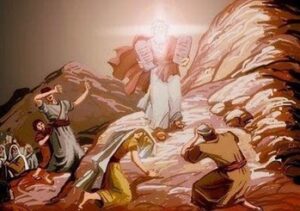2 Corinthians 3:7–18
7Now if the ministry that brought death, which was engraved in letters on stone, came with glory, so that the Israelites could not look steadily at the face of Moses because of its glory, transitory though it was, 8will not the ministry of the Spirit be even more glorious? 9If the ministry that brought condemnation was glorious, how much more glorious is the ministry that brings righteousness! 10For what was glorious has no glory now in comparison with the surpassing glory. 11And if what was transitory came with glory, how much greater is the glory of that which lasts!
12Therefore, since we have such a hope, we are very bold. 13We are not like Moses, who would put a veil over his face to prevent the Israelites from seeing the end of what was passing away. 14But their minds were made dull, for to this day the same veil remains when the old covenant is read. It has not been removed, because only in Christ is it taken away. 15Even to this day when Moses is read, a veil covers their hearts. 16But whenever anyone turns to the Lord, the veil is taken away. 17Now the Lord is the Spirit, and where the Spirit of the Lord is, there is freedom. 18And we all, who with unveiled faces contemplate the Lord’s glory, are being transformed into his image with ever- increasing glory, which comes from the Lord, who is the Spirit.
Something’s Got to Change
“Something has got to change.” That’s what the mom was telling me. Her child was out of control, and mom knew that something had to change for him, but closer to home, she had to change if she was going to help him. Something has got to change. Have you had that thought about yourself? I’ve got to change the way I treat my family. I’ve got to stop procrastinating. I’ve got to change what I look at on my smartphone. I’ve got to change my dedication to Bible reading or church life. What’s the area in your life where something’s got to change?
All of us wrestle with that, and then you hear something like the gospel reading for today. On a mountain, in an instant, Jesus was able to change himself. He was glorious; he shone like the sun. And he hears this booming approval from heaven, “This is my Son, whom I have chosen. Listen to him!” (Luke 9:35). It must be nice, Jesus, to be that glorious. We call this Sunday “The Transfiguration of Our Lord” because it’s Jesus who looks so glorious on that mountain. But then I look around my life, and it’s not glorious. Sometimes it’s the opposite of glorious, so God gave us the second reading from 2 Corinthians 3. It’s there we learn about the sermon theme:
“The Transfiguration of Our Lord’s Followers”
-
-
-
Your transfiguration does not come from
-
Your transfiguration comes from
-
-
The Apostle Paul’s Letter of Transfiguration
The Apostle Paul wrote 2 Corinthians about 20 years after Jesus died and rose from the dead and went back to heaven. The book of 2 Corinthians is a letter that Paul wrote to the church in the city of Corinth. That church had a lot of issues. There was infighting, sexual addictions, self-centered members, and more. The Corinthians knew that something had to change. While Paul was traveling, other teachers moved into Corinth—bad guys who we can help you change if you simply follow our rules. Oh, did that make Paul mad! Paul had learned from Jesus that transfiguration does not come from laws.
You know, a lot of people think like those bad guys in Corinth. Have you ever made a deal with yourself like that, maybe a New Year’s resolution, or you’re going to buckle down every day and follow your own rule? If laws are all you have, you may see small changes for a while, but they will never transform your life. Laws simply aren’t powerful enough to change people.
Moses And God’s Law
St. Paul told the Corinthians a story about the power of laws. You know, it makes sense that human laws can’t change people. You’ve maybe sensed that. An online article, “5 Ways to Turn your Life Around,” doesn’t usually work as advertised. Or a sermon series, “How to transform your marriage” if the sermon is just a bunch of rules for you to do, it won’t work for long. St. Paul takes it one step further. He says, “forget about human rules; what about God’s laws?”
Remember when God wrote down the laws for people to follow? It was back in the desert after the Israelites escaped from Egypt. Moses would go up a mountain and talk to God. God gave Moses a contract. If you people do A, B, and C, then I, your God, will do X, Y, and Z. The most famous part of the contract is the Ten Commandments, but there’s more. These laws from God were so much better than an online article, so much better than any self-help book that God wanted the Israelites to know it was great. So when Moses came to tell them the contract, his face was glowing with the Lord’s glory. They couldn’t even look at him because they were afraid! That’s what God’s law does. It terrifies us. Criminals hide from police officers because they broke the law and they are afraid. Sinners hid their faces from the Lord because they broke God’s law and they were afraid. Fear is the appropriate response to God’s law.

But there was a problem. The Israelites were not afraid enough of the Lord. You see, the glory of the Lord that shone from the face of Moses, it didn’t last. It faded away to show that God’s two-way contract was not his final word; it wasn’t the ultimate thing. God knew that if the Israelites saw the glory fade, they may not take God’s law seriously after it faded. Do you know how that goes? Like if you’re in school, and the teacher gets upset, you are terrified of misbehaving… for a little while. But the next day, the threat starts to fade from your memory.
The rules didn’t transform you; they only changed your behavior for the afternoon. That’s why Moses put a veil over his face. He didn’t want the Israelites to see the glory fading. He wanted them to keep being afraid of breaking God’s laws! It didn’t work. Moses put a veil over his face to keep the Israelites afraid. But the Israelites put a veil over their hearts to shield them so God’s law wouldn’t make them afraid.
What is Your Veil?
You’ve done that too. Maybe the veil you put over your heart sounds like this: “I’m not perfect, but at least I’m not like HER.” Your veil might say, “I won’t hurt anyone or even talk bad, but there’s no way God can expect my thoughts to be perfect.” Sometimes your veil may be, “Out of billions of people, there’s no way God cares what I do.”
Do you know what St. Paul would say about your veil? 14Their minds were made dull, for to this day, the same veil remains when the old covenant is read. It has not been removed, because only in Christ is it taken away. (2 Corinthians 3:14).
Jesus Removes Your Veil
You and I have dull minds when it comes to God’s law. Did you catch how we can take the veil away? Look at Christ. You may think sin is no big deal until you see Jesus. Jesus says, “Anyone angry with a brother or sister will be subject to judgment.” (Matthew 5:22). Jesus says, “Whoever looks at a woman lustfully has committed adultery with her in his heart.” (Matthew 5:28). And then Jesus shows you the actual cost of breaking the contract with God. Look at Jesus on the cross, beaten within an inch of his life, then suspended between earth and sky until he’s dry enough to expire. And then the maker of heaven and earth leaves him for dead. What happens to me at the foot of the cross when I gaze at the object of God’s anger? The veil is being removed from my eyes. When I see what sin costs, what my sin costs, I realize I will never be good enough for God. I can never keep his commandments up to his standards. And what do I have to say for myself? “I’m sorry.” So are you.
There’s a great scene about spiritual transformation in the C.S. Lewis novel The Voyage of the Dawn Treader. A character named Eustace has turned himself into a monster, into a dragon, and he desperately wants to turn himself back into a boy, so he starts pulling scales off his body. It is exactly like how we try to change ourselves by our best attempts at following rules. Eustace says,
“I scratched off a third time and got off the skin like the other times. But as soon as I saw myself in the water, I knew it was no good. Then the lion said… ‘you will have to let me undress you.’ I was pretty afraid of his claws, but I was pretty near desperate now. So I just lay down on my back to let him do it. The very first tear he made was so deep I thought his claws had gone straight to my heart. And when he began tearing the skin off, it hurt worse than anything I had ever felt. The only thing that made me able to bear it was just the pleasure of feeling the stuff peel off. You know, if you’ve ever picked the scab of a sore place, you know it hurts like a billy-oh, but it’s such fun to see it coming away… Well, he peeled the beastly stuff right off, just as I’d done it myself the other three times, only they hadn’t hurt. And there it was lying on the grass, only thicker and darker and more knobbly looking than the others had been. And there was I as soft and smooth as a peeled switch and smaller than I’d been.”
You know who the lion is, don’t you? It’s Jesus. The transfiguration of followers of Jesus comes not when we try our best to do what God says but when Jesus undresses us. Confronting God’s law without a veil over your eyes is scary! It reminds you of death and condemnation. God’s laws bring death, and they bring condemnation, and they bring them to Jesus.
See Jesus on the cross? He’s the object of God’s wrath! He is suspended between earth and sky so that you never have to be! He is forsaken by God so that you aren’t. See Jesus on the cross. It’s the most glorious thing God ever did. The transfiguration of our Lord was beautiful to behold, but seeing Jesus’ face shine didn’t make the disciples any shinier. Hearing God say, “This is my Son,” doesn’t make you a child of God. But Jesus’ death on the cross and his glorious resurrection, that makes you God’s child. That opens heaven for you where you will indeed shine like stars. Jesus’ death and resurrection is the most glorious thing God ever did, and contemplating Jesus’ glory, well, that will change you. Paul says, “We all, who contemplate the Lord’s glory with unveiled faces, are being transformed into his image with ever-increasing glory.” (2 Corinthians 3:18).
Jesus Transfigures You
 I sat one time in a college dorm room with a young man who could not remember his life before pornography. As I asked him about his sin, I watched him cave in on himself. “Do you know that’s wrong?” He physically curled down. “Do you know what God says about that?” He shrunk even smaller. God’s laws were doing what God designed them to do. They were killing him. So then we contemplated Jesus. In our imaginations, we went to the cross and then the empty tomb. We spent a good half hour contemplating just how glorious it is that Jesus loves him.
I sat one time in a college dorm room with a young man who could not remember his life before pornography. As I asked him about his sin, I watched him cave in on himself. “Do you know that’s wrong?” He physically curled down. “Do you know what God says about that?” He shrunk even smaller. God’s laws were doing what God designed them to do. They were killing him. So then we contemplated Jesus. In our imaginations, we went to the cross and then the empty tomb. We spent a good half hour contemplating just how glorious it is that Jesus loves him.
The glory of what Jesus has done to save you is the only thing that can change you. That can make you actually hate your bad habits. That can make you love Jesus like never before. It can lead you to Are you flexing that power in your life? In your marriage, you can stay up five minutes later to talk about your faults and Jesus’ glorious forgiveness. In your Life Group, you can admit your shortcomings and contemplate what Jesus has done to make it ok. In your personal thought-world, you could do with a little less self-help and a little more God loves me for Jesus’ sake.
A Tool To Contemplate The Lord’s Glory

Can I offer you one tool to help you contemplate the Lord’s glory? You know that this Wednesday, we begin Lent. That’s 46 days where we prepare our hearts for the Lord’s glorious death and resurrection. Do you know what will make this Easter more meaningful for you? If you’ve spent 46 days contemplating the Lord’s glory. I found an online Bible reading plan that takes you through the story of Jesus’ life in 46 days. We’re going to read that together. There’s a half-sheet in your bulletin with all the instructions. Or, if you’re watching online, use your smartphone to scan the code on your screen to get started.
While everyone else is giving things up for Lent, I challenge you to add something. Why? So that we will be transformed by contemplating the Lord’s glory. We all will be transfigured one day at a time until that day when you are radically transformed into the most glorious version of you. And he’ll do it as we contemplate the Lord’s glory.
Amen.


